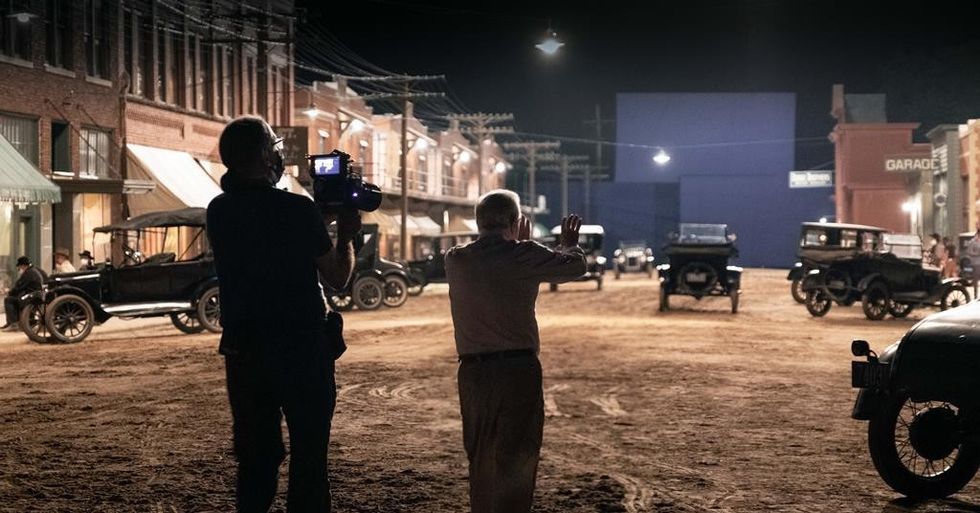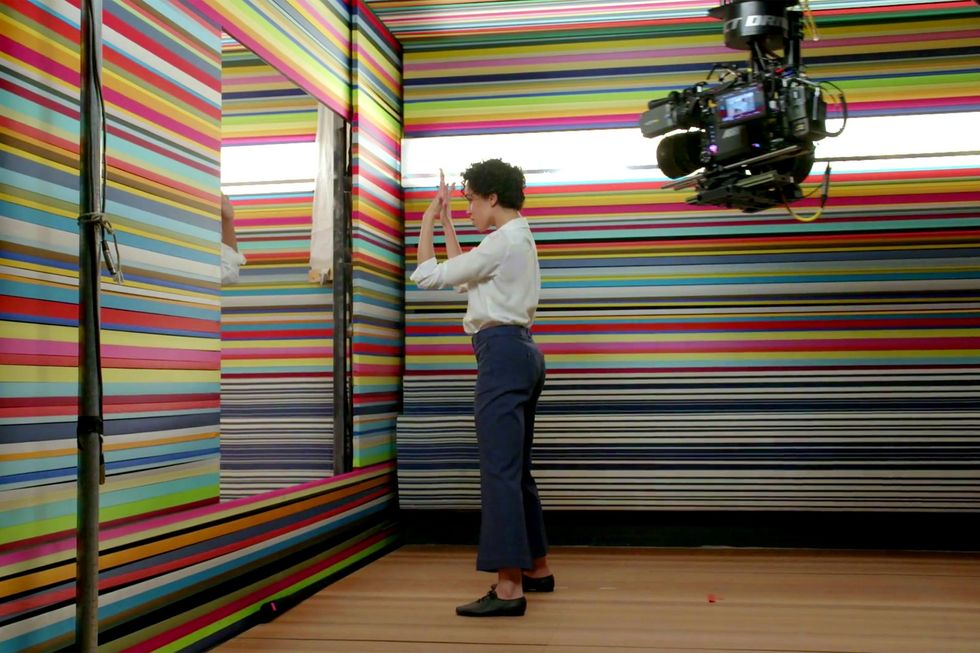
I logged onto Twitter this morning to see that Boston University, where I got my MFA in Screenwriting, is about to start charging $90,000 a year for tuition. Upon reading that, I spit coffee all over and went for a long walk.
I came back with a fire in my belly, ready to write this article.
Boston University, Tufts, Wellesley, and Yale will now top $90,000 a year for tuition, housing, and other expenses, according to the schools’ admissions websites. Other private colleges around New England are also likely to cross that threshold. https://t.co/mPQPyLO3TF
The fact is, unless they set you up with a job at a studio and an Arris Alexa, there is no way it’s worth $90,000 a year—that’s over a quarter of a million dollars for an education that may take you nowhere.
At this point, I think the best course of action for anyone trying to break into film and TV is to get a practical degree in something, make real money doing a real job on the side, and learn to be a filmmaker for free through online resources.
Let’s dive in.
The Cost of Education is Way Too High

I had a pretty good year last year when it comes to film and TV. I worked on an adapted feature and wrote for a TV show. And that was with six months of my year being obscured by a strike.
But 10% of that money I made, before taxes, has to go to my loans. And those loans? They’ve been gaining interest since I graduated in 2012.
Back when I went to BU, it was around 50K a year, and I had a small scholarship. Still, over the course of a couple years, I had to take out around 100K to help cover my tuition and rent. Now, with the compound interest, that’s hovering around 200k that I owe, and rising.
Grad school is only two years long. Thank God I went to Penn State for undergrad, and was able to pay that off while in school.
Hearing what kids are paying today to get a job in an industry experience extreme contraction, where luck goes way further than talent, is frightening.
I already think I am massively screwed, unless I sell a spec for around two million dollars. I cannot imagine how hard it will be for people coming after me paying that much.
And if you’re coming out of school and moving to Los Angeles, you should be aware of the costs here. Rent is very high right now and always has been. And entry-level job may get you paid around $50k a year. After taxes, you will probably be devoting around half of your salary to rent alone.
When I started, I only make $36k a year and basically lived going into debt until I sold a screenplay, which helped me break even for two years, and then I had to get side jobs, and eventually get a job here where I make basically modern entry-level money, and hope I sell things on the side to survive.
This is not a sustainable Hollywood, especially for people without rich parents who pay their bills. So how can you survive?
Making it In Hollywood Without Film School

I legitimately think if I had to do it all over again, especially with all the resources available today, I would go back and get a solid college degree in something more tangible and try to build a side career while learning filmmaking for free.
Hollywood has artificially low salaries for assistants and low-level executives because they know they are the only place that can provide the chance to make movies and TVs.
Other industries simply not not have the same baggage. So if you got a job in finance or advertising or even teaching, you can use nights and weekends to sort out filmmnaking.
And you could use your vacation days to visit Los Angeles. Or even move here and get a job in another industry that pays better.
Look, I didn’t take this route, so maybe I’m not an authority on it. But I can tell you I only talk to one guy from BU in Hollywood. He and I have never worked together. And while he helped me get an internship, every paid gig I got on my own.
Now, where my career is, after having to break in a few times, I can say that working in film and TV and struggling helped me make the connections to book work later.
I still think this is the best way to network and meet people and get recognized.
But it has never made me financially stable. At best, it allows you to tread water before bigger paychecks come. But those checks are fewer and fewer and the industry discovers how to balance, you may consider at least keeping your overhead costs as low as possible.
That means state schools, smart degrees, and real jobs.
And free resources.
What Are Some Free Resources for Aspiring Filmmakers?

I took some time and built a while film school curriculum with hyperlinks to some of our most popular free education resources.
But it’s not all about us, so we should dig in.
Learning Platforms
- YouTube: An absolute treasure trove of knowledge. Some great channels include:
- Film Riot: Visually engaging tutorials covering cinematography, special effects, and creative short filmmaking.
- Indy Mogul: The kings of DIY filmmaking, showing you how to achieve impressive results on a budget.
- DSLRguide: In-depth camera knowledge, gear reviews, and cinematography tutorials.
- Peter McKinnon: Stunning visuals, cinematography techniques, editing tips, and vlogs from a successful filmmaker.
- Filmmaker IQ: Dives into the history and theory of cinema, explores filmmaking techniques, and analyzes iconic films.
- Lessons from the Screenplay: Analyzes the screenwriting techniques behind successful movies.
- This Guy Edits: Explores the art of editing with insightful breakdowns of movie scenes and editing styles.
- Every Frame a Painting: (Currently inactive, but the archive is fantastic!) Insightful video essays dissecting cinematography, directing techniques, and visual storytelling.
- D4Darious: Advice on building a filmmaking career, navigating freelancing, equipment, and client work.
- Matti Haapoja (invalid URL removed): Vlogs and filmmaking tutorials from a cinematographer working on major commercials and films.
- Mark Bone Cinematography: A working cinematographer shares his set experiences, lighting breakdowns, and insights into the industry.
- Potato Jet: Tips on building a business as a filmmaker, marketing yourself, and making money with your skills.
- Masterclass: While not fully free, platforms like Masterclass often offer individual classes or free trials. Seek out classes by filmmakers you admire.
Industry Insights & Career Advice
Podcasts
We have an expansive list of great ones for filmmakers. Here’s some overlap and new ones:
- The Big Picture: Wide-ranging focus on the film industry, pop culture trends, and the business of Hollywood.
- Filmspotting: In-depth reviews, top-five lists, and insightful discussions on classic films, new releases, and everything in between.
- Scriptnotes: Screenwriting gold from veteran screenwriters John August and Craig Mazin. They break down the nuts and bolts of screenwriting, from concept to finished product.
- Team Deakins: Cinematography legend Roger Deakins and his collaborator James Deakins explore the art and technique of cinematography.
- Off Camera with Sam Jones: Celebrated photographer/director Sam Jones sits down for long-form conversations with directors, actors, and other artists.
- The A24 Podcast: Discussions on the films and creative process behind the acclaimed indie studio A24 (Moonlight, Ladybird, Everything Everywhere All at Once).
- The Director’s Cut: A podcast presented by the Directors Guild of America, featuring conversations with notable film directors.
- The /Filmcast: Film reviews, news, and entertaining discussions from the perspective of dedicated film lovers.
- You Must Remember This: Fascinating deep dives into the forgotten and secret histories of Hollywood’s golden age and beyond.
- Indie Film Hustle: Practical advice on all aspects of independent filmmaking, from development to distribution (and tons of inspiring interviews!)
- The Business: From the Hollywood Reporter, this podcast reveals the business deals and power players shaping the entertainment industry.
- The Treatment: Long-form discussions and analysis of filmmaking from KCRW, hosted by Elvis Mitchell.
- No Film School Podcast: It’s us! A mix of filmmaker interviews, gear reviews, and industry discussions offering a filmmaker’s perspective.
- The Town: In-depth discussions about the business and craft of Hollywood filmmaking
- The Ankler: Insider news, analysis, and commentary on the entertainment industry, known for its sharp takes and scoops.
Inspiration & Community
- Reddit: Subreddits like r/filmmakers, r/cinematography, and r/screenwriting are great to ask questions, share work, and connect with others.
- Vimeo: A platform hosting high-quality short films and creative work. A great place to find inspiration and study different styles.
- Film Festivals: Attend festivals (even virtually) to immerse yourself in new and inspiring work, like Sundance, SXSW, Cannes, Toronto International Film Festival (TIFF), and smaller regional festivals.
- Filmmaker Interviews Look for in-depth interviews with your favorite directors on podcasts and filmmaker-focused websites. Many podcasts on the previous list are great for this!
- Visual Inspiration: Follow cinematography/directing-focused accounts on Instagram, Pinterest, and Behance to get a daily dose of stunning visuals
- Local Filmmaking Groups: Search Facebook and Meetup for filmmaking groups in your area. Connect, collaborate, and attend workshops or screenings together.
- Filmmaking Collectives: Find online filmmaking collectives dedicated to collaboration, support, and feedback. Some are niche-focused (women filmmakers, documentary filmmakers, etc.)
- Social Media: Follow and engage with filmmakers you admire on Twitter, Instagram, etc. Build relationships and seek mentorship when appropriate.
- Film Challenges: Participate in online filmmaking challenges or short film contests for motivation, deadlines, and a sense of community with other participants.
Sound and Music
- Freesound.org: An extensive database of free sound effects under various licenses.
- Incompetech: A website by composer Kevin MacLeod offering royalty-free music for various uses.
- BBC Sound Effects: A selection of sound effects from the BBC’s archives, free to use for personal projects.
The best way to learn is by doing!
These resources are amazing, but nothing replaces shooting your own films and experimenting.
Author: Jason Hellerman
This article comes from No Film School and can be read on the original site.
